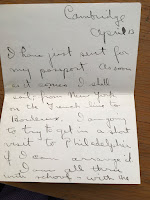https://www.jameschanningshaw.com
-->
-->
Emmett’s last encounter with Ernest Hemingway had nothing to do with
drinking. He told it this way:
“After Hemingway was transferred to the Red Cross Hospital in Milan,
no one back at ambulance headquarters thought he would drive again. Rumors were
that he would be lucky to walk. Unexpectedly, after six months, he returned to
say his goodbyes and gather his belongings before returning to the States. But
he came back to an empty locker. His locker had been cleaned out and he was
hopping mad about it! I ran into him that afternoon. All he said, looking down
at my khakis, was ‘Shaw, those are my pants.’ All I could say was ‘Yes, sir,
they are.’ I apologized and returned the pants the next day, laundered, of
course. That’s the last time I saw Ernest Hemingway. No handshake. Nothing.
C’est la vie. C’est la guerre.”
At
home after the war during prohibition the art of drinking degenerated into a
sort of a nightmare and good drinking companions were indeed hard to find. I
like to forget those wasted years between 1920 and 1932 when we were forced to
buy synthetic liquor from bootleggers and thugs and drink it in bedrooms and
toilets and back alleyways. My best drinking companion during most of those
awful years was a druggist who made his own poison by mixing a half pint of
grain alcohol with an equal amount of strawberry pop. It was a vile concoction
and ruinous to the digestion. We did most of our drinking in the rear of his
drug store surrounded by shelves of patent medicine bottles and cosmetics.
One
other fairly steady drinking companion I had during this gloomy period who was
also a glutton for punishment specialized in moonshine. Between us we usually
managed to keep a jug or two of the pale fluid that maims and kills cached in
convenient places. He could handle the stuff a lot better than I. He liked it
raw and the more it burned the better it seemed to suit him. I was finally
forced to withdraw from this partnership. I just couldn’t stand the pace.
After
repeal when it once more became possible to obtain decent liquor and drink it
without hiding, I renewed many old acquaintances and even made one or two new
ones.
As
time goes on, however, I find myself for one reason and another taking it a
little easier. I have almost ceased looking for new drinking companions. On
rare occasions I meet up with one of the old friends of bygone years and of
course we always celebrate the event in the fitting and proper way.
Only
last year Larry Fisher came through town. I hadn’t seen him but once since the
old days in France and Italy. We drank whiskey and soda until far into the
night and fought the war all over again. After midnight he got his wife on the
phone and introduced me over the long distance wire.
I
have never claimed to be much of a connoisseur. I have always drunk and still
drink largely for the fun and conviviality. If my drinking companion prefers
wine, I usually drink wine. And if it’s beer or gin or rye or bourbon or rum or
anything except moonshine, the same holds true.
There
have even been times when I have gone for weeks without taking a drink. During
such periods, although I may feel fine and everything running smooth, I rarely
seem to have any fun and am usually lonesome as hell.
I
love a good drinking companion. They are so rare. I have drunk with many during
the past years, some good, some bad. The perfect ones are very, very few. I
cherish their memory and the memory of the wonderful times we had drinking
together.
Emmett continued to write and tell stories of North American Fronts:
Fronts of gold prospecting in California, the Alaskan frontier immediately
after it became a state, and histories of Civil War fronts and Texas in the making. But the beer glass
is empty now. All that remains is the memory of the whiff of aroma.
The End
-->
-->



